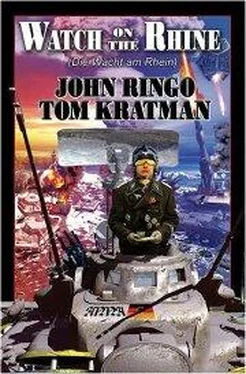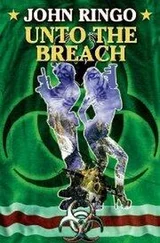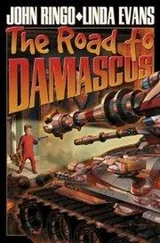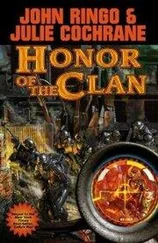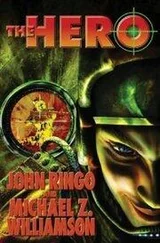Lübeck, Germany, 1 March 2008
Seven Tigers, along with a half a battalion each of panzers and panzer grenadiers, reinforced with all that remained of the Brigade’s artillery — a couple of undersupplied batteries, stood lonely guard south of the town. To the north and the west, the shattered Kampfgruppen [48] Battle groups.
of nine Korps — perhaps the equivalent of a dozen or fifteen divisions, preinvasion — dug in furiously. A further four Korps , or the scraps that remained of them, were turning Hamburg into a fortress to grind the alien enemy. From Hamburg, stretched thin along the Elbe River’s broad, deep estuary, what remained of the Bundeswehr and a few SS, all bridges before them blown, awaited the final enemy onslaught.
Ferries operated by the Bundeswehr Pioneere [49] Combat engineers.
evacuated what could be evacuated of the millions of trapped civilians and soldiers lining the Elbe’s southern banks. All, perhaps, could have been evacuated in a matter of days had the bridges been left standing. And yet all knew, now — at last — they knew, that some evils were worse than others, and that killing the helpless was not always the worst evil.
It had been a long, hard and bitterly contested withdrawal for Hans Brasche and his men. They had made stands at Potsdam and northwest of Wittenberge and around Schwerin. Each temporary stand had bought time. Each moment of time had bought human lives moved to safety. The price for the salvation of those civilian lives had always been the same: blood and steel and fire, unmarked graves and fat-bellied aliens, gray- and black-clad bodies left to rot or — more likely — to feed the enemy host.
Each stand was a physical defeat, seeing the Brigade driven back leaving smoking tanks and ruined men behind. Yet each stand had bought the seeds, O let it be so, of future victory.
Hans was as proud of his men as ever he had been of the men he had led in Russia… or the legionnaires… or the Israelis, once he had earned Israeli trust.
Hans’ left hand stroked his right lapel, feeling the Sigrunen sewn there. And they are clean, my soldiers. No crimes to their name, not even the crimes of necessity. Their sins, if any, I have assumed. And I was likely damned anyway.
Well, thought Brasche, I will find out soon enough.
Kiel, Germany, 3 March 2008
Most of the refugees had to make the weary trek north on foot with occasional wheeled transportation to assist. Medical units, such as were not needed at the front or, more importantly, were needed to care for the wounded, assembled with their charges instead at Kiel on the Baltic coast for movement by sea to Stockholm, Oslo, Helsinki, and even Glasgow, all cities still in human hands and likely to remain that way. Some combat units, those judged too exhausted and depleted, also mustered at Kiel for the northward journey.
In a scene reminiscent of Dunkirk, or the Japanese evacuation of the Aleutian Islands, masses of people waited in tents, or shivering in the cold open air, for word that another ship was loading, and they were to join it.
The Posleen, of course, attempted to stop the evacuation, as a farmer might prevent the escape of a turkey destined for the dinner table. Yet Danish, Swedish, Norwegian, Finnish and British Planetary Defense Batteries were generally successful at keeping the alien ships at bay. Moreover, the Swedes had jury rigged several stout merchant ships with salvaged Posleen railguns. These last gave the aliens fits as they never remained in one place long enough for the Posleen to engage.
Despite the defenses, though, more than one human merchant vessel lay sunken and smoking at its moorings among Kiel’s many wharfs and quays. Still, out in the fjord, the city’s natural harbor, everything from huge container ships to little two person sailboats bobbed among the waves, awaiting the call to come in and dock. Though Posleen fire occasionally succeeded in pelting the harbor from space, the greatest danger to the ships and boats assembled was each other.
Harbormasters from the usual, civilian, port authorities, supplemented by the sailors of the Germany Navy, kept order as best they could. This best was poor enough, given the density of watercraft in the fjord. More than one crash had occurred, with resulting great loss of life.
* * *
This one has lost his will to live , thought the doctor, a psychiatrist trying desperately and, in the case of Thomas De Gaullejac, unsuccessfully, to heal the hidden wounds of war.
The boy had been cleaned up now, his black uniform exchanged for a fresh gown of hospital green. The trench-bred lice were gone; his hair was cut. Even so, his weight was down and continuing to plummet. He ate, when he ate, only on command… and then, only if watched.
The doctor had tried everything he knew. When all of that had failed he had even called in a chaplain, thinking, Where art and science fail perhaps faith may help. Sadly, the boy appeared not to have been raised to be terribly religious. The chaplain’s “God’s inscrutable will” had fallen on deaf ears.
The doctor knew the story behind young Volunteer De Gaullejac. This had been drawn out early on, before his disease of the mind had taken him over so fully. Once the course of the boy’s guilt had been determined, the doctor had tried a different approach, calling in one of Charlemagne’s officers to explain to Thomas that he had not been unique; that almost the entire front had seen men unable to kill the helpless victims of the Posleen’s human shield.
“That does not mean that I didn’t also fail,” De Gaullejac had insisted. His condition had taken a turn for the worse then, enough so to make the doctor regret having brought in the soldier to assist. It was at that time also that it had become necessary to watch the boy to ensure he ate.
* * *
Isabelle watched over her remaining son like a brood hen guarding her last egg. She had seen more than one child, separated from its parents, wandering lost and alone between Wiesbaden and here at Kiel. The fact that she never saw the same child twice spoke grim volumes about the likely fate of many of those children. Though her heart had ached for them, she saw the children only in passing, as the division used its motor transport to race away from the aliens.
Mother and son had boarded ship only a few hours before. Becaause they were a family unit, however small, the ship’s Norwegian crew had found them a small, a very small, stateroom for the voyage. Though after the filth she had seen in the last few months the ship seemed almost eerily clean, an unpleasant aroma — residue of recent passengers who could not take a rough sea voyage, perhaps — pervaded the vessel’s interior.
Instructing her youngest to remain there in their stateroom, Isabelle had gone to help with loading and billeting the rest of the hospital staff and their patients on the ship.
* * *
Her name was Cordelia and she was out of Haifa. Once her stern had sported the Flag of Liberia, a ruse that fooled no one but was considered useful in carrying cargos to ports, mainly Muslim ones, that would never have accepted an Israeli-flagged vessel.
Now, however, there were no Muslim ports of any significance left in the world. The little blue-and-white ensign fluttering on her short mast told the world, and any Posleen who dared come close enough, that here was an Israeli ship.
The ensign was the only clean thing about the ship, for she had carried a load of passengers from Haifa before the fall of that town, and had been continuously engaged in ferrying Israelis and Europeans to the north, and war materials to the south, for over a month with no chance for maintenance or even sanitation.
Читать дальше
